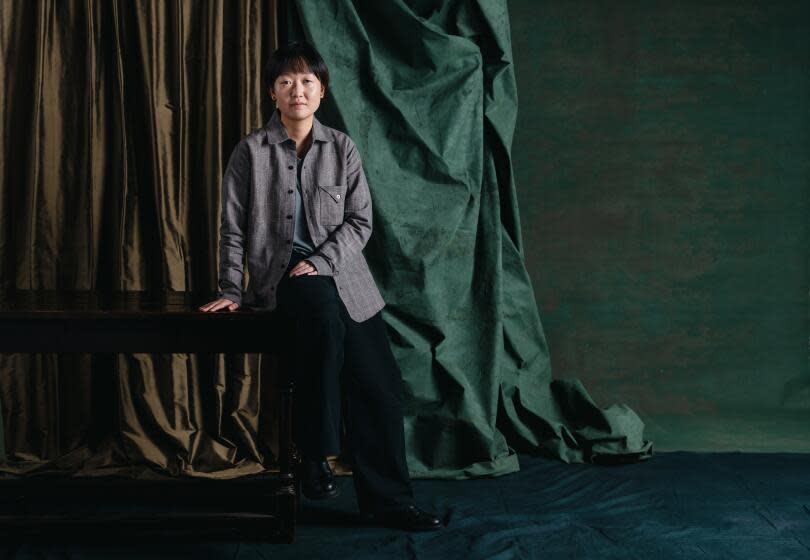With the success of her first film, 'Past Lives,' Celine Song has found her future

One night in 2018, at a bar in the East Village, Celine Song fell through a career-altering hole in the space-time continuum.
Song, the director and Oscar-nominated screenwriter of the bittersweet romance “Past Lives,” was having drinks with her husband, playwright and novelist Justin Kuritzkes, and her childhood sweetheart, who had traveled from South Korea to New York to see her. As she sat between them, translating between English and Korean as best she could, she realized she was really doing far more than that.
“I was actually translating between two parts of my own self,” Song said in a recent video interview from her Manhattan home. “What's amazing is that each part was a mystery to the other. In that moment I was encapsulating my past, present and future at once, and it felt like my whole life was collapsing. There was a new revelation about what it is like to be living through such vast amounts of time and space and of leaving parts of ourselves behind as we move.”
This sensation is at the heart of Song’s debut film, which was also nominated for best picture after becoming a critical darling and word-of-mouth sensation coming out of last year’s Sundance Film Festival. “Past Lives” tells the story of Nora (Greta Lee) and Hae Sung (Teo Yoo), once mutually infatuated 12-year-olds in South Korea, now trying to reconnect as 30-somethings. Like Song, Nora immigrated to Canada as an adolescent, and then to New York, and became a playwright. Hae Sung stayed in Seoul and became an engineer. Skipping forward in two 12-year intervals, the film asks questions about love, time and geographic barriers that strike a nerve in all manner of viewers. (It also includes a re-creation of that mind-expanding night at the bar.)
In conversation, Song comes across as an openhearted philosopher, happy to talk matters of the heart and the mind and grateful to have come out of the filmmaking gate with such a surge. It was a daunting process, she says, for which her 10 years as a New York playwright helped her prepare.
“The list of things that I didn't know was unbelievably long,” she says of filmmaking. “The list of things that I did know was one thing, which is what was in the script — story, character, how I see things, what I think will work. Then every day the list of things that I don't know is shrinking, and then the list of things that I do know starts to grow. I had my script, which is really my blueprint. That's my little book that I'm walking around like, 'OK, this is going to conquer everything. This is going to slay the dragon.’ That's what it felt like.”
Read more: Greta Lee explains the 'surgical' precision of 'Past Lives'' shattering ending, beat by beat
Song infuses “Past Lives” with an effortless bilingualism, switching between Korean and English throughout the film, and eventually including both in the same scenes. She credits the success of “Parasite,” Bong Joon Ho’s 2019 Korean social satire that took home the Oscar for best picture, for the fact that nobody in the “Past Lives” production process raised alarms about her film’s use of subtitles.
The language gap is a central element of the film, representing both Nora’s assimilation into American culture — the adult Hae Sung chides her for her rusty Korean — and the tension between Hae Sung and Nora’s American husband (John Magaro), who speak each other’s languages tentatively but respectfully when they first meet. Magaro actually speaks some Korean (his wife is Korean American), but Song wanted him to play that down for the character; similarly, Yoo, who was born and raised in Germany and studied acting at the Lee Strasberg Theatre and Film Institute in New York, speaks English far more proficiently than the man he plays.
But for Song, the idea goes far beyond verbal comprehension.
“In the final section of the film, Nora is so deep in the culture of being a New York artist, and Hae Sung is so deep in the culture of his own work life,” she says. “Even though they share the culture of Korean-ness, there's a level in which they actually are not even a part of the same culture anymore. That complexity is a fundamental part of this story, and it always was, because it was written by me, who is every day dealing with this contradiction of being many things at once.”
Now Song has one more piece of identity to work with: Oscar-nominated filmmaker. Coming relatively late to the game, she shows an instinctive touch for the form and a sense of visual grammar you would expect from someone who’s been doing this for years.
Fortunately, she plans on sticking around.
“It was a complete revelation,” she says. “Every day you're showing up, learning something new. I've never experienced something so exhilarating. I'm going to keep making movies until I die.”
This story originally appeared in Los Angeles Times.


